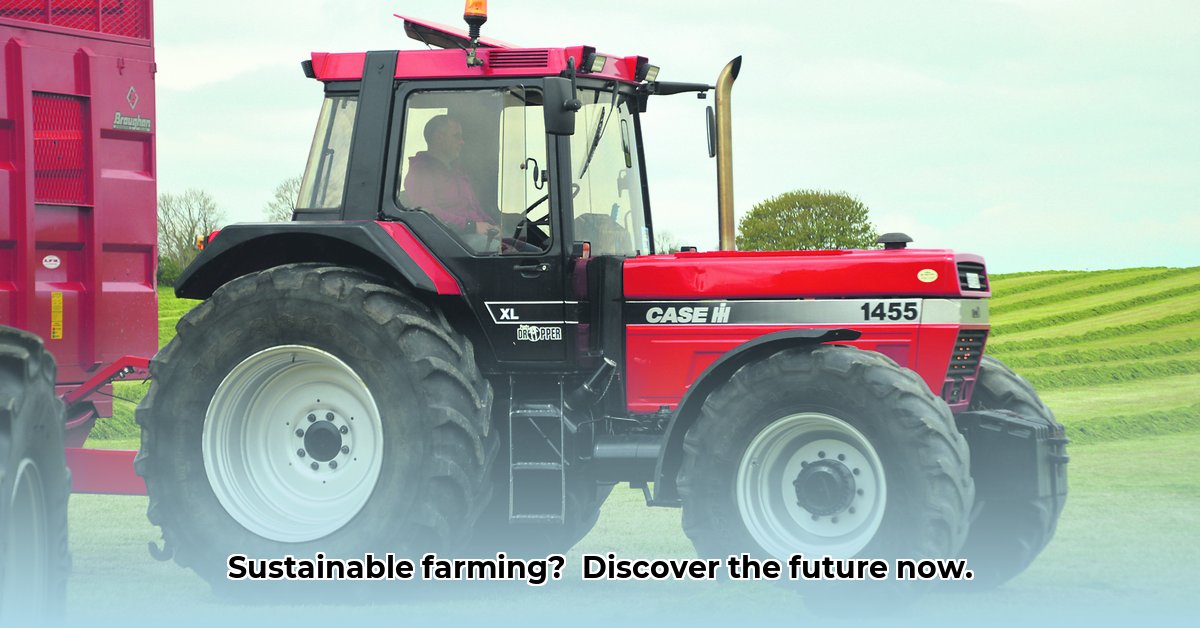
Sustainable farming is no longer a niche concept; it's a necessity. Farmers face increasing pressure to produce more food with fewer resources, demanding a shift toward environmentally responsible practices. This article explores how Case IH tractors are contributing to this crucial transition, examining their role in sustainable agriculture and highlighting areas for improvement. Learn more about the new Case IH tractors here.
Fuel Efficiency: A Cornerstone of Sustainable Farming
Case IH frequently promotes the fuel efficiency of its tractors, a critical factor in both economic and environmental sustainability. Reduced fuel consumption directly translates to lower operating costs for farmers and a smaller carbon footprint for agriculture. But marketing claims require verification.
How much fuel does a Case IH tractor actually save compared to competitors? Detailed data comparing fuel consumption per acre across different Case IH models and various farming tasks (plowing, planting, harvesting) would provide compelling evidence of their fuel efficiency. This level of transparency is crucial for farmers seeking to minimize their environmental impact and maximize their profitability. Without this data, assessing the true extent of fuel savings remains challenging.
What about the total cost of ownership (TCO)? A lower fuel consumption rate could save farmers money now, but if the tractor's maintenance or repair costs are higher, that savings could be negated.
Beyond Fuel: A Holistic Approach to Sustainability
Fuel efficiency, while vital, represents only one aspect of sustainable agriculture. The entire life cycle of a tractor – from manufacturing to disposal – significantly impacts its environmental footprint.
“We need a comprehensive understanding of the entire product lifecycle,” says Dr. Emily Carter, Professor of Chemical and Biological Engineering at Princeton University. “This includes evaluating the energy and resource intensity of manufacturing, the use phase including fuel consumption, and finally responsible end-of-life management. Only then can we accurately assess a tractor's overall environmental footprint.”
To achieve a holistic sustainability assessment, more information is needed. Data on manufacturing processes, including greenhouse gas emissions and energy consumption, is essential. Details regarding the sourcing of materials and their sustainability, along with the tractor's expected lifespan, recyclability of components, and end-of-life management strategies, are critical for a comprehensive evaluation. Without this data, claims of sustainable farming remain unsubstantiated.
Analyzing Case IH Tractor Series for Sustainability
Let's examine specific Case IH tractor lines. The Farmall series, known for its versatility across various terrains and crops, offers potential for improved land use and reduced environmental pressure. But we need quantifiable data to support these claims. How much land is actually saved? What's the measurable reduction in fertilizer or pesticide use directly attributable to the Farmall's adaptability? Concrete numbers are vital for a valid assessment.
Similarly, models like the Farmall N and CL, with their narrower designs suitable for specialized farming (e.g., vineyards), represent Case IH's commitment to sustainable practices. However, long-term data is crucial to understand the extent of their environmental benefits. What is the actual long-term reduction in environmental impact achieved by these specialized designs?
Recommendations for Greater Transparency and Sustainability
To enhance the transparency and sustainability of Case IH's operations, several key steps are necessary:
Conduct Full Lifecycle Assessments (LCAs): Case IH should conduct comprehensive LCAs for all tractor models, tracing their environmental impact from cradle to grave. These LCAs will pinpoint areas for improvement across the entire product lifecycle.
Promote Open Data Sharing: Publishing detailed specifications, including fuel consumption data for various tasks, facilitates comparisons with competitor tractors, enabling informed decision-making by farmers and policymakers.
Prioritize Sustainable Manufacturing: Adopting sustainable manufacturing practices—including renewable energy sources, reduced waste generation, and responsible material sourcing—is crucial for minimizing the environmental impact of tractor production.
Develop End-of-Life Management Plans: Case IH needs a comprehensive plan for recycling and reusing tractor components, aligning with circular economy principles and minimizing waste in the disposal phase.
Investing in a Sustainable Agricultural Future
The agricultural sector faces a turning point. Farmers, investors, and policymakers share a responsibility to foster sustainable farming practices. Case IH tractors have the potential to play a significant role, but realizing this potential demands greater transparency, data-driven analysis, and a strong commitment to sustainability throughout the entire product lifecycle – from design and manufacturing to utilization and responsible end-of-life management. The future of agriculture hinges on it.